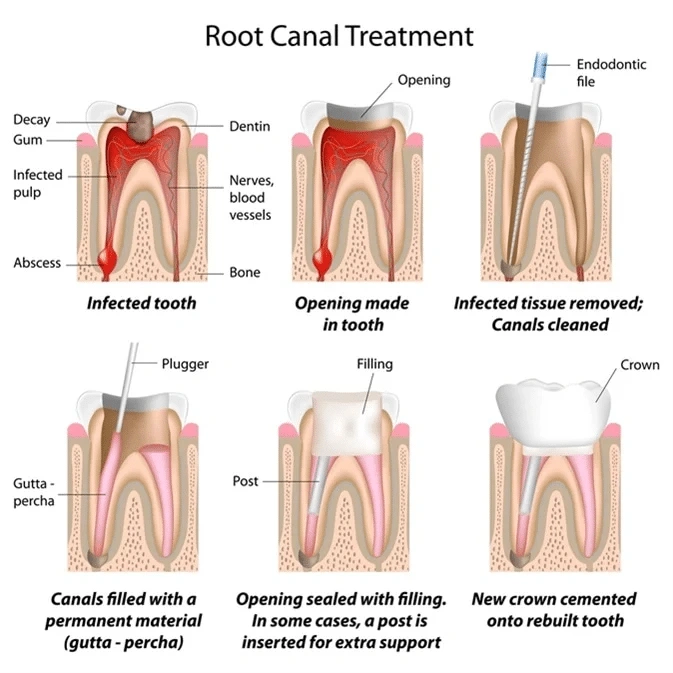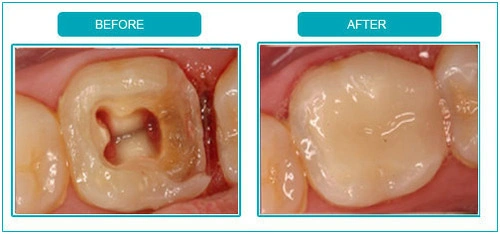Pain free Root Canal Treatment in Motor City, Dubai
At Acer Dental Clinic we offer pain free root canal treatments. We are located in the heart of Motor City in Dubai and we specialize in providing long lasting, minimally invasive root canal treatments that are microscope assisted. We have the latest equipment and imaging technology to deliver pain free, efficient and predictable results.

What is Root Canal Treatment?
Root canal treatment is a dental procedure designed to
- Relieve tooth pain
- Save a tooth that has been severely damaged or infected.
The process involves removing the infected or damaged pulp (nerves) from inside of the tooth, cleaning and disinfecting the area, and then filling and sealing it to prevent further infection.
At our dental clinic, we provide microscope assisted root canal treatments. This method significantly reduces the weakening of teeth post-treatment and promotes better healing, as we are saving as much tooth material as possible. By providing better vision, the endodontist’s precision is also enhanced during microscope assisted root canal treatments

- Maintenance after root canal treatment
- When is it necessary?
- How does a root canal treatment work?
- Why is it important?
- Why us?
What can you do, so that your root canal treated tooth can last a lifetime?
- Placing a crown on a root canal treated tooth: is important because the treatment often involves removing a significant portion of the tooth’s structure, which can weaken it. A crown helps restore the tooth’s shape, strength, and functionality, ensuring it can withstand biting and chewing forces. Additionally, a crown provides a seal to protect the tooth from bacteria, reducing the risk of future infection.
- Regular Brushing and Flossing: Brush at least twice a day and floss daily to remove plaque and prevent cavities.
- Dental Check-ups every 6 months: This should include tooth cleaning and monitoring the health of the treated tooth and surrounding gums.
- If you don’t have a crown yet on the root canal treated tooth: Use fluoride toothpaste and mouthwash to strengthen tooth enamel and protect against decay.
Following these steps will help in maintaining the integrity of the root canal treatment and supporting overall oral health. Watch our full video on the topic https://www.youtube.com/watch?v=GYfaRU-_xwo
This treatment is necessary when:
- The tooth has a deep cavity.
- There is a bacterial infection in the tooth pulp, where the nerves are.
- There is inflammation or infection in the roots.
- The tooth is damaged from trauma.
- There is severe tooth pain from deep decay.
- There are signs of abscess on X-rays.
By addressing the root cause of tooth pain, root canal treatment not only provides:
- Tooth pain relief, but also
- Preserves the natural tooth
- Preventing the need for extraction and replacement
A root canal is a critical dental procedure aimed at removing infection from within a tooth, thereby preventing its spread throughout the body.
By cleaning out the infected pulp and sealing the tooth, it not only alleviates pain but also helps maintain overall health.
This treatment is essential for stopping the infection at its source and safeguarding against further systemic health issues, emphasizing the importance of dental health in relation to general well-being.
We utilize a microscope by Carl Zeiss, therefore enhancing visibility during the procedure, supporting our minimally invasive approach and preserving natural tooth structure.
This method significantly reduces the weakening of teeth post-treatment and promotes better healing, as we are saving as much tooth material as possible
Our root canal treatment specialist has over 20 years of experience and can confidently deliver the best possible results.
Join Us on a Journey to Exceptional Dental Health
Your search for comprehensive, high-quality dental care in Dubai ends here. At our clinic, we’re not just about treating dental issues; we’re about fostering lasting relationships with our patients, providing education, and promoting preventative care to ensure a lifetime of oral health. With our combination of experienced specialists, cutting-edge technology, and unwavering commitment to excellence, we’re ready to transform your dental experience

Initial Phone Consultation:
Fill out the form below and we will contact you about your dental needs and expectations, providing personalized advice on your potential treatment options.

Specialist In-Clinic Examination
After the phone consultation we will invite you to our clinic for an examination, where you’ll receive a detailed treatment plan/dental offer tailored to your specific situation.

Booking Your Appointment:
With your treatment plan in hand, the next step is to book your appointment and start your dental journey!
Our Specialist

Dr. Sreejith Sreedhara Kurup
Dr. Sreejith Sreedhara Kurup is a highly skilled Specialist Endodontist in Dubai, known for his precision in advanced root canal therapy and restorative dental treatments. With over 12 years of clinical experience and expertise in cutting-edge endodontic techniques, he is committed to delivering painless, high-quality care and lasting results.
Acer Dental Clinic
5 Key Reasons to Receive
Your Free Consultation Today
25% OFF ON ALL DENTAL TREATMENTS
PERSONALISED TREATMENT PLANS

MINIMALLY INVASIVE PROCEDURES
LATEST EQUIPMENT & BEST MATERIALS
SPECIALISTS WITH 20+ YEARS EXPERIENCE
25% OFF ON ALL DENTAL TREATMENTS
PERSONALISED TREATMENT PLANS

MINIMALLY INVASIVE PROCEDURES
LATEST EQUIPMENT & BEST MATERIALS
SPECIALISTS WITH 20+ YEARS EXPERIENCE
Simply Fill Out the Form and We Will Contact You About Your Dental Journey
Take the first step towards a healthier smile. Book your appointment with Acer Dental Clinic today and experience personalized care from our expert team of dental professionals.
Frequently asked questions
At our clinic, we specialize in pain-free root canal treatments, providing excellent care with the latest pain management techniques. Our expert team ensures a comfortable experience, prioritizing your comfort and dental health. Trust us for a worry-free, gentle dental procedure.
The process involves three key stages: cleaning the inside of the tooth, filling and sealing the tooth, and restoration, often with a crown for protection.
A root canal can last a lifetime with proper care and hygiene.
The procedure usually requires at least two visits: one to clean the root canal system and another to complete the filling and sealing. Multiple visits ensure thorough cleaning and healing, preventing future infections.
You may need a root canal if bacteria inside your mouth invade the pulp (nerves) inside your tooth and cause inflammation. This may happen if:
- You have a deep cavity in the tooth that needs treatment.
- You have a cracked, fractured or damaged tooth, and bacteria infects your tooth.
- Some Gum disease also may cause bacteria to infect the tooth
If you have an infected tooth, you may need root canal treatment to clear out the infection. You can have infected teeth without symptoms. When you have symptoms, they may include:
- Tooth Pain that doesn’t go away. Lots of things make your teeth hurt. But pain that’s deep in a tooth or that spreads to your jaw, face or other teeth may mean you have an infection.
- Pain increasing to Stimulus. Sometimes you may notice taking cold or hot food causes pain which lingers on
- Pressure hurts. If your tooth hurts when you eat or touch it, it may mean something damaged the nerves around your tooth pulp.
- Pain when lying down. Increasing pain while sleeping is the result of increased pressure inside the tooth due to infection
- Swollen gums. If you have an infected tooth, your gums may swell or feel tender.
Before beginning treatment, your dentist or endodontist will take dental X-rays of the affected tooth. They may do other tests to determine if your tooth pulp is dead, infected or inflammed and confirm that you’ll need a root canal. They may:
- Gently tap on your tooth or touch it with a cold or hot substance to check for sensitivity or discomfort.
- Check for signs of swelling in the gums and bone around your tooth.
- Ask if it hurts when you bite down on your tooth.
During root canal treatment, your dentist or endodontist removes the inflamed pulp. Then they clean and disinfect the inside of your tooth and place a filling on your tooth to seal the space.
- Your provider injects anesthesia to numb your infected tooth and nearby gum.
- Next, your provider places a thin, flexible piece of rubber over your infected tooth and nearby gums. This is a dental dam that keeps your tooth dry during treatment.
- They drill a tiny hole in your tooth’s crown so they can get to your tooth pulp.
- Then, they use tiny dental instruments to remove nerves, blood vessels and tissues inside your tooth pulp.
- After clearing out pulp, your provider cleans and disinfects your pulp chamber and root canals.
- Next, they fill the empty pulp chamber and root canals with a flexible, rubbery dental material called gutta-percha.
- Your provider then seals your tooth with a temporary or Permanent dental filling. The seal keeps bacteria from getting into your tooth.
- In the last step, your provider places a dental crown or Overlay on your treated tooth. Dental crowns protect your teeth and restore your bite — the way your teeth fit together when you bite down. Dental crowns are typically made to order, so it may be two or three weeks before this last step happens.
Yes, a root canal treatment can be performed on a tooth that already has a crown. The procedure involves drilling through the crown to access the tooth’s pulp chamber and root canals. After the root canal is completed, the dentist will either seal the access hole with a filling material or, in some cases, recommend replacing the crown to ensure a proper seal and protect the tooth from further damage. This approach allows the tooth to be saved without removing the existing crown, although the integrity of the crown may be affected by the procedure.
Yes, it is a common and safe procedure. Prior to the treatment we will ask about any allergies you may have, take your vitals and will make sure that you are fit for treatment.
Yes, like any medical procedure, there is a possibility of failure. This can occur if the infection wasn’t completely removed, if the tooth cracks, if the restoration is defective, or due to new decay. If a root canal fails, retreatment or other procedures like apicoectomy or tooth extraction might be necessary.
Root canal treatments are generally not associated with causing eye problems. Complications that affect areas outside the mouth are extremely rare. However, the body’s systems are connected, and very occasionally, dental infections, if left untreated or not properly managed, might spread or have systemic effects.
No, there is no scientific evidence to suggest that root canal treatment causes cancer. This misconception may stem from outdated theories and has been debunked by current dental medicine research. It’s important to rely on the latest, evidence-based medical information when considering the safety and side effects of dental procedures.
Yes, root canal treatments can potentially lead to an infection if bacteria remain in the canal after the treatment or if the tooth becomes contaminated again. Proper sterilization techniques and a well-sealed crown after the procedure usually prevent this. Additionally, optimal oral hygiene (brush and floss twice a day) and regular visits to the dentist, preferably every 6 months are important in prevention.
However, if an infection does occur, additional treatment would be necessary.
Yes, a root canal treatment can be redone if necessary. This is known as retreatment and it may be required if the original treatment does not heal properly or if a new infection occurs. Retreatment involves reopening the tooth, removing the filling materials, cleaning the canals, and refilling and resealing the tooth. When a retreatment is necessary, going with a microscope assisted root canal treatment is the best option. Due to enhanced vision the specialist can make sure that everything is done properly and that no unnecessary tooth material is removed.
Yes, root canal treatment can be done on front teeth. The procedure for front teeth is similar to that for other teeth, aimed at treating the inside of the tooth when the pulp becomes infected or damaged. However, as front teeth typically have only one root canal, the treatment can usually be done faster. A restoration, like a crown is then recommended due to the possibility of discoloration of the teeth, long term. The restoration will also help the tooth last longer, by making it stronger.
Root canal treatment is typically performed by dentists, including general dentists who have received training in endodontic procedures. However, for more complex cases, a specialist called an endodontist, who has additional training in treating tooth pulp and the inner parts of the tooth, might perform the procedure. At Acer Dental Clinic all root canal treatments are performed by specialist endodontists with extensive background to ensure that the patients receive the best quality.
A root canal treatment typically takes one to two dental visits, each ranging from 30 minutes to a 1,5 hours, depending on the complexity of the case and the condition of the tooth.
The concept of root canal treatment has evolved over centuries, but the procedure as we know it today began to take shape in the 18th and 19th centuries. Advances in dental science and technology during the 20th century further refined the technique, making it safer and more effective.
When choosing a dentist make sure that risks and all treatment options are discussed. When you go to a consultation the dentist should take an x-ray and a CBCT-scan if necessary. During the consultation the specialist should tell you what the root cause of the problem is, the different treatment options, for example doing a root canal treatment or a microscope assisted one, the possibility of extraction, and the type of restoration they recommend. Look at reviews, how many years of experience the specialist has and the equipment they have available at the clinic.











